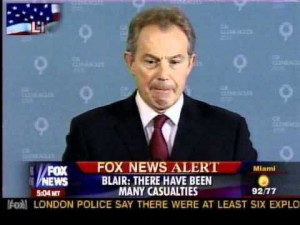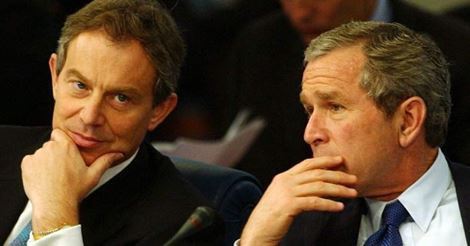It was in March 2003 that Britain joined the United States in the illegal invasion of Iraq.
As is by now commonly accepted, the British government under Tony Blair had done all it could to help fabricate justifications for the war: including producing the infamous ‘sexed up dossier’.
Other controversies surrounded the lead-in to the Iraq War, including things like the suspicious death of weapons expert Dr David Kelly.
Most of this is well known by now, so there’s no need to reexamine all of that here. Everyone knows lies were told and deceptions staged.
What is also more well accepted now is the extent to which Israel and Benjamin Netanyahu guided the Bush regime into the Iraq War and the general Middle East destabilisation programme.
Always also key to remember is that Israel also orchestrated 9/11: the start point and pretext for both the Iraq War and the broader War on Terror – a ‘War on Terror’ that had been based on Netanyahu’s own blueprints.

But what of Tony Blair and the British government?
Putting aside the obvious connectivity between the British and Israeli states, particularly in intelligence circles, or the obvious Zionist influence in both Westminster and Washington, I had always found it curious why Blair in particular had schemed so hard to fabricate the case for war.
Sure, he had famously stood ‘shoulder to shoulder’ with George W. Bush after 9/11 and pledged that the UK would be by America’s side. But that was primarily pointing to the War in Afghanistan and the overall War on Terror bullshit.
Why was a generally popular Prime Minister, leading a Labour government, so committed to what would be a very unpopular war – risking his own popularity and legacy to do so?
It could be that he was simply ideologically aligned with the Neo Cons? Or someone blinded by their own inflated ego and sense of vision. But I had often wondered if Blair was simply a compromised individual, with skeletons in the closet. Via which he could be manipulated into certain actions.
None of which would excuse him from any culpability – Tony Blair is pretty much irredeemable at this point.
But the recent revelation that Blair had in fact met with Jeffrey Epstein while he was Prime Minister has prompted me to re-ask this question.
The new information confirming at least one Blair/Epstein meeting has emerged during the scandal surrounding Epstein’s relationship with Lord Mandelson.
Mandelson himself was of course already an Epstein asset in the Labour party and Westminster. We are told it was via Mandelson that the Blair meeting was arranged. As is reported: ‘Emails seen by BBC News show Lord Mandelson pushed for the meeting, telling Sir Tony’s chief of staff Jonathan Powell that Epstein was “a friend of mine” who ex-US President Bill Clinton hoped to introduce to the PM.’
What’s particularly interesting about the Blair/Epstein meeting was the date: it occurred in 2002. Which would place it just months before the launch of the Iraq War – but during the period in which preparations for the invasion were underway.
The question then: to what extent did Epstein’s meeting with Blair influence the course of events that followed? And was Blair compromised in any way?
You could argue that it doesn’t matter. After all, Anglo-American-Zionist machinations were not dependant on Epstein/Maxwell operations. With or without kompromat, Blair would’ve probably still played his part in the great theater.
And it’s also possible that Blair’s discussion with Epstein, as with many of the other high profile individuals, was to do with finance and not any sexual matters. That’s what’s been implied in the newly revealed documents.
But we also can’t underestimate the importance of the role Blair played, particularly in helping legitimise what was an illegal war based on lies. And therefore the question of whether he did so under some degree of duress becomes an item of historic curiosity.

Even if Blair himself wasn’t directly compromised, the ‘Prince of Darkness’ Lord Mandelson evidently was: and his influence over Blair and the government becomes equally interesting.
For example, notes from the Chilcot Inquiry revealed that Mandelson was ‘given privileged access to Whitehall intelligence…’ in relation to the lead-in to the Iraq War, despite not being member of the government at the time.
The Epstein/Maxwell/Mossad influence over those events therefore keeps being a question.
Mandelson was famously highly aggressive in his public condemnation of Labour MPs who opposed the war – despite supposedly having been initially sceptical of the invasion, at least in private.
One should remember how much the party had been torn by the plan to invade Iraq. Famously, Robin Cook (the Foreign Secretary) resigned over it. Cook went on to be highly vocal in his scepticism about both the Iraq War and the War on Terror – and soon died suddenly. I examined the subject of his death here.
Cook’s death, along with the death of David Kelly and various other suspicious elements, demonstrate that there were some highly dubious forces in play during the build-up to the war.
It didn’t stop there either. Even years into the war, the 7/7 London Attack was staged by British and Israeli intelligence to maintain continued popular support for the British involvement in Iraq and the overall War on Terror.

If Blair was a liar, he was a liar many times over.
Interestingly, both Blair and Mandelson have reemerged as significant players in recent months: with Blair’s institute pushing the current government towards the mandatory digital ID and Blair also being made a key figure in the so-called Gaza peace plan, while Mandelson was until recently made UK ambassador to Washington.
It was only because of the recent Epstein-related revelations (the “yum yum” letter and all that) that Mandelson was removed from his Washington position.
Yet even during his short spell as ambassador to the Trump administration, Mandelson’s activities invite suspicion.
For example, during Keir Starmer’s visit to Washington in February, the PM also had a separate meeting with Peter Thiel’s Palantir Technologies, their HQ being just a ten minute drive from the White House.
The meeting had been organised by Mandelson himself.
As reported in April, ‘no official record was kept: no minutes, no transcript. Just a handshake, a quiet word, and — for many — a growing unease… What precisely Starmer and Mandelson discussed with Palantir remains unknown. The Cabinet Office insists it was merely an “informal visit”…’
But as the article informs is, ‘at the time of the trip, Palantir was still a client of Global Counsel—the lobbying firm founded by Mandelson.’
Palantir can also be connected to the digital ID push that was heavily influenced by the Tony Blair Institute (which was written about here).
So, decades on from the disastrous Iraq War, both Blair and Mandelson are still highly active players in political and global affairs.
The spectre of high-level global politics being implemented by highly compromised individuals also remains hard to ignore.
Look at it this way, for example: Mandelson (an Epstein client) was made UK Ambassador to the administration of US President Donald Trump (also an Epstein client); while his former boss Tony Blair (who met Epstein while Prime Minister) is heavily influencing current UK government policy.
Hell, Blair’s Washington counterpart during his early years as Prime Minister was also an Epstein super-friend in the form of Bill Clinton.
The connections are everywhere.
Yet I suppose we should also remember that compromised individuals with dirty secrets running our politics isn’t new.
As I examined way back here, you can find scores of even just UK-specific examples of high-level politicians making extremely important decisions… who later were revealed to have been involved in (or accused of) extremely dubious sexual activities.
This included government ministers like Leon Brittan and Cyril Smith, ex Prime Ministers like Ted Heath, royalty like Lord Mountbatten, as well as heads of MI5 and MI6, even a head of NATO, etc.
And from the same article, we noted how ‘Inquiries into why Britain’s Home Office mysteriously lost 100 files documenting allegations of an organised pedophile ring involving politicians have also stalled recently, with the panel’s chair stepping down, due to a conflict of interest. Tony Blair is reported to have blocked the exposure of famous names in law, business and politics, including some in his own Cabinet, during the police investigation known as Operation Ore, which itself spun off from an FBI investigation called Operation Avalanche in the US…’
Most of us don’t realise how far back this kind of stuff goes.
As I asked way back then, it begs the troubling question: to what extent have historic or contemporary decisions effecting thousands or millions of people, either domestically or in various parts of the world, been undertaken by individuals involved in these types of activities?




